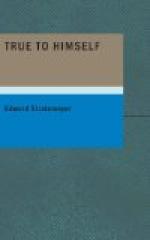The yell be gave would have done credit to a wild Indian, and he bounded a distance of several feet. I was not slow to take advantage of this movement, and in an instant I was on my feet and several yards away.
Duncan’s rage knew no bounds. He was mad enough to “chew me up,” and with a loud exclamation he sprang after me, aiming a blow at my head as he did so.
I dodged his arm, and then, gathering myself together, landed my fist fairly and squarely upon the tip of his nose, a blow that knocked him off his feet and sent him rolling to the ground.
To say that I was astonished at what I had done would not express my entire feelings. I was amazed, and could hardly credit my own eyesight. Yet there he lay, the blood flowing from the end of his nasal organ. He was completely knocked out, and I had done the deed. I did not fear for consequences. I felt justified in what I had done. But I wondered how Duncan would stand the punishment.
With a look of intense bitterness on his face he rose slowly to his feet. The blood was running down his chin, and there were several stains upon his white collar and his shirt front. If a look could have crushed me I would have been instantly annihilated.
“I’ll fix you for that!” he roared. “Roger Strong, I’ll get even with you, if it takes ten years!”
“Do what you please, Duncan Woodward,” I rejoined. “I don’t fear you. Only beware how you address me in the future. You will get yourself into trouble.”
“I imagine you will be the one to get into trouble,” he returned insinuatingly.
“I’m not afraid. But— hold up there!” I added, for Duncan had begun to move off toward the fence.
“What for?”
“I want you to hand over the pears you picked.”
“I won’t.”
“Very well. Then I’ll report the case to Mrs. Canby.”
Duncan grew white.
“Take your confounded fruit,” he howled, throwing a dozen or more of the luscious pears at my feet. “If I don’t get even with you, my name isn’t Duncan Woodward!”
And with this parting threat he turned to the fence, jumped over, and strode down the road.
In spite of the seriousness of the affair I could not help but laugh. Duncan had no doubt thought it a great lark to rob the widow’s orchard, never dreaming of the wrong he was doing or of the injury to the trees. Now his nose was swollen, his clothes soiled, and he had suffered defeat in every way.
I had no doubt that he would do all in his power to get even with me. He hated me and always had. At school I had surpassed him in our studies, and on the ball field I had proved myself a superior player. I do not wish to brag about what I did, but it is necessary to show why Duncan disliked me.
Nor was there much love lost on my side, though I always treated him fairly. The reason for this was plain.
As I have stated, his father, Aaron Woodward, was at one tune a fellow-clerk with my father. At the time my father was arrested, Woodward was one of his principal accusers. Duncan had, of course, taken up the matter. Since then Mr. Woodward had received a large legacy from a dead relative in Chicago, or its suburbs, and started the finest general store in Darbyville. But his bitterness toward us still continued.




